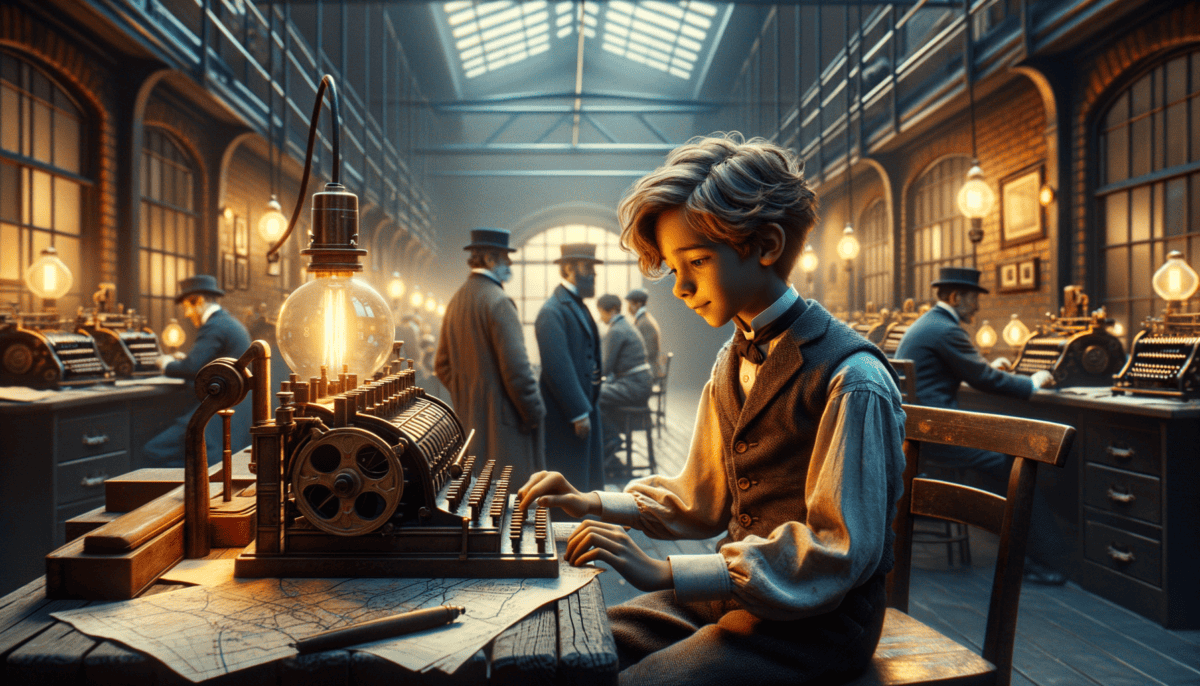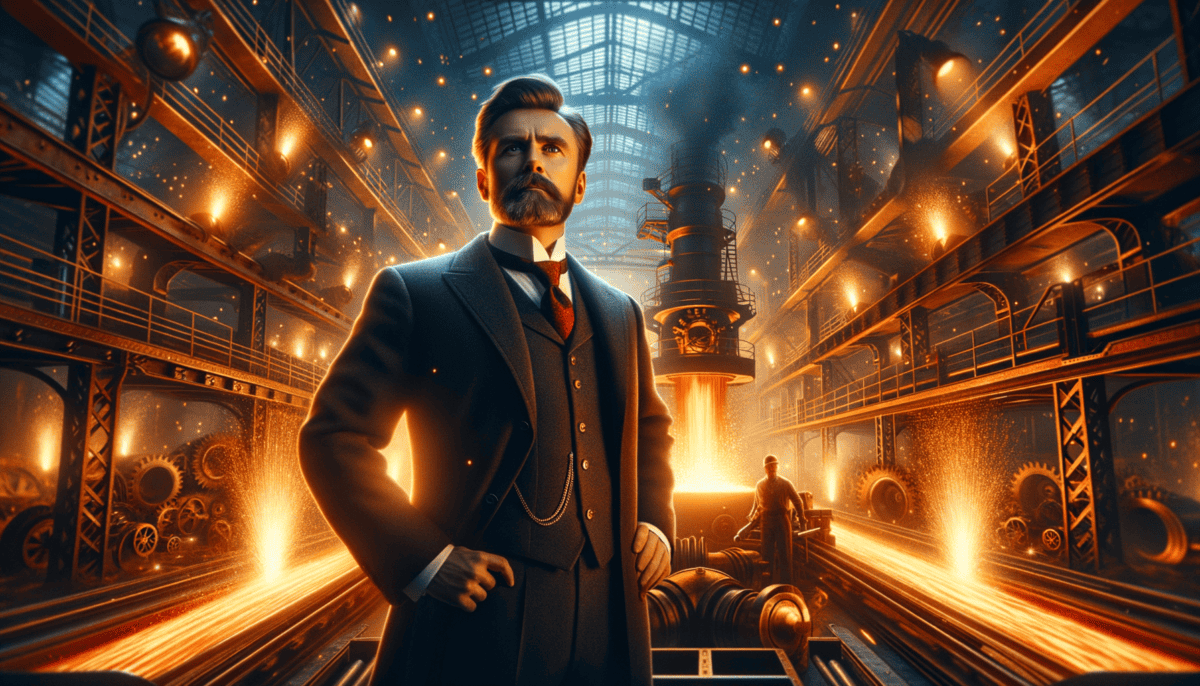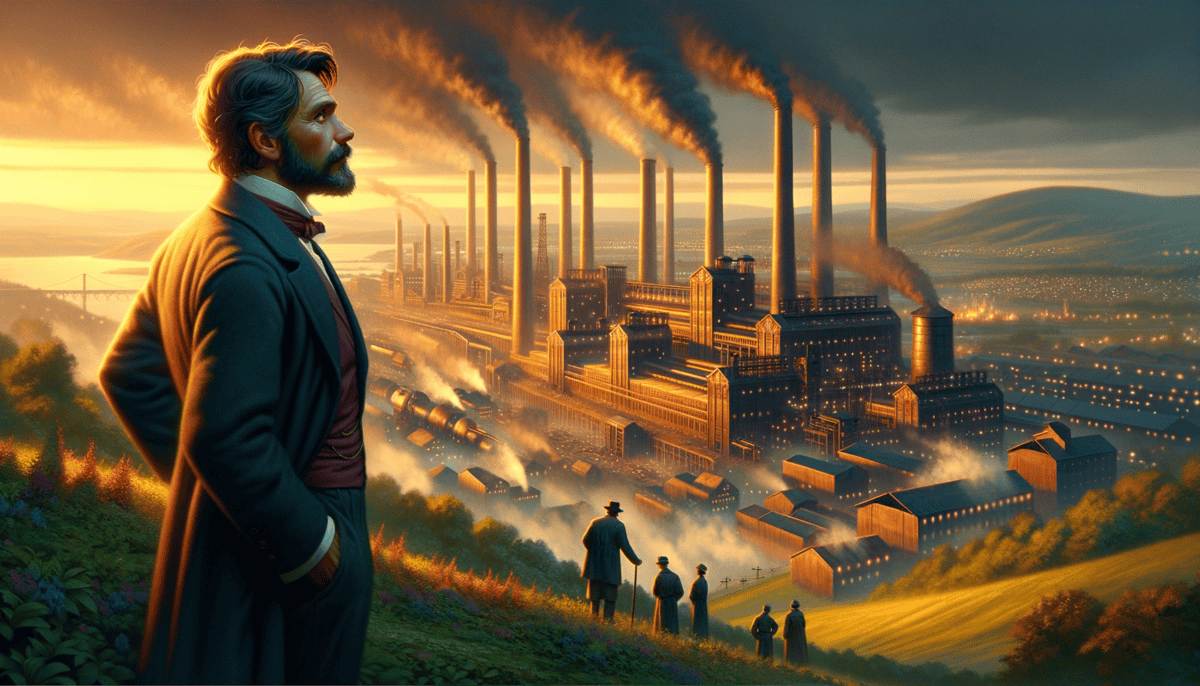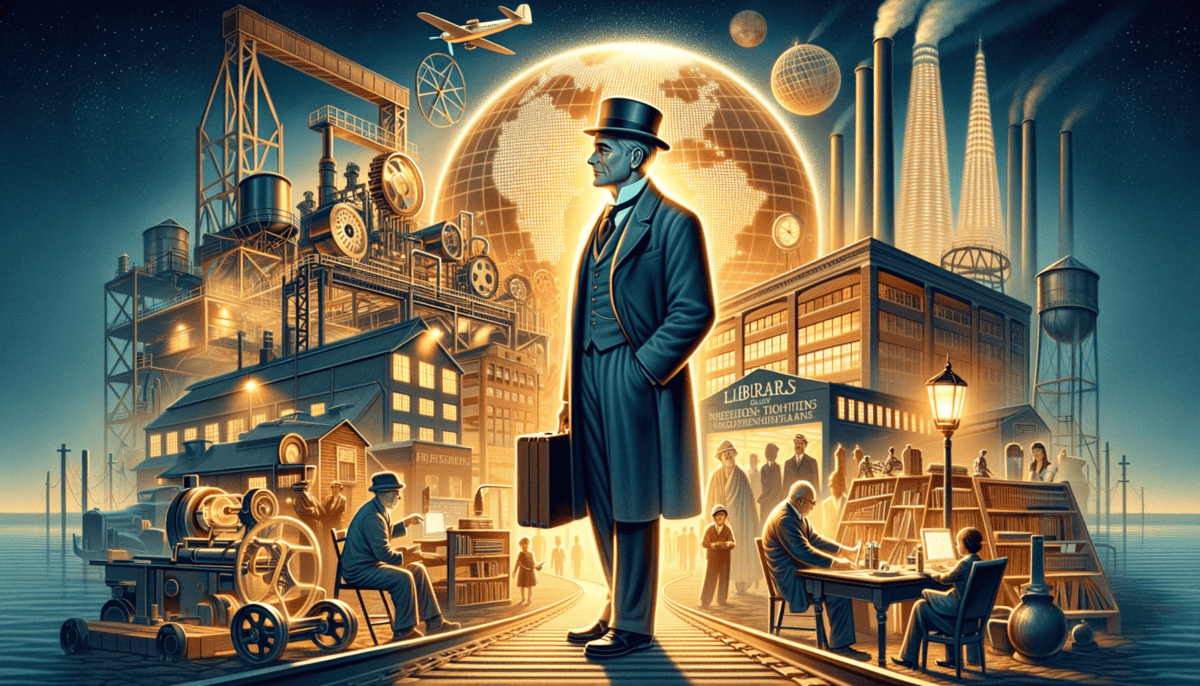A Boy from Scotland
In a small stone cottage in Dunfermline, Scotland, lived a young boy named Andrew Carnegie. The year was 1835, and life wasn't easy for his family.
"Andrew, come help with the weaving!" his father William would call. Young Andrew watched his father work at the loom, making beautiful fabrics. His mother Margaret worked hard too, fixing shoes and cooking meals for the family.
Little Andrew loved to listen to his uncle's stories about heroes and adventures. His uncle would say, "Knowledge is power, wee Andrew. Remember that." These words stuck with young Andrew throughout his life.
But times were getting harder in Scotland. New machines in big factories were doing the work that people like Andrew's father used to do. Many families couldn't make enough money to buy food.
One day, Andrew's mother said, "We must go to America. There we can have a better life." Andrew was just 13 years old when his family packed their few belongings to sail across the ocean.
The Big Journey
The boat ride to America was long and scary. The waves were huge, and many people got sick. But Andrew stayed brave, thinking about the adventures ahead.
"Look, Andrew!" his father pointed one morning. "That's America!" The young boy rushed to see the shoreline of their new home. They had arrived in Pittsburgh, Pennsylvania, where some of their relatives already lived.
The family didn't have much money when they arrived. They lived in a small room, and everyone had to work. Andrew's first job was as a "bobbin boy" in a cotton factory. He worked 12 hours every day, making just $1.20 per week.
But Andrew didn't complain. Instead, he thought about his uncle's words about knowledge being power. Every Saturday, he would visit the home of a kind man named Colonel James Anderson, who let working boys borrow books from his library.
"These books," Andrew would later say, "opened the magic world of knowledge to me."
New Beginnings
Even though the work was hard, Andrew kept learning and looking for better opportunities. He taught himself to use the new telegraph machine, sending messages across wires. This skill would change his life forever.
One day, while delivering a message, Andrew met Thomas Scott, an important railroad man. Mr. Scott saw how smart and hardworking Andrew was and offered him a new job at the Pennsylvania Railroad.
"Thank you, sir!" Andrew said excitedly. "I won't let you down!"
This was just the beginning of Andrew's amazing journey in America. The poor boy from Scotland was about to show the world what he could do. His story teaches us that with hard work and learning, we can overcome big challenges.
• Never stop learning
• Work hard
• Stay brave when things are tough
• Look for new opportunities
As night fell over Pittsburgh, Andrew looked out his window at the busy city. He missed Scotland sometimes, but he knew America was full of possibilities. With determination in his heart, he was ready to chase his dreams in this new land.
Making His Way Up
Young Andrew Carnegie loved his new job as a telegraph messenger boy! He ran through the busy streets of Pittsburgh, delivering important messages to businesspeople. His feet got tired, but his spirit stayed strong.
Andrew had a special trick – he learned all the streets and shortcuts in Pittsburgh by heart. “I can deliver messages faster than anyone!” he would say proudly. His boss noticed how quick and smart he was.
The Telegraph Master
During quiet times at work, Andrew watched the telegraph operators tap out messages in dots and dashes. Click-click-click! went the telegraph key.
“Would you teach me how it works?” Andrew asked one of the operators. Soon, he was practicing the code every chance he got. He even learned to read the messages by listening to the sounds!
One day, an important message came in when no operator was around. Andrew stepped up and took the message perfectly. His boss was amazed!
“Young man,” his boss said, “you’ve got quite a future ahead of you!”
Meeting Important People
Working with the telegraph helped Andrew meet lots of important business people. One special person was Thomas Scott from the Pennsylvania Railroad. Mr. Scott liked how Andrew worked hard and used his brain to solve problems.
“How would you like to be my assistant?” Mr. Scott asked Andrew one day. Andrew couldn’t believe his ears!
First Steps in Business
Mr. Scott taught Andrew about investing money. “If you buy something that makes money, like railroad shares, your money grows,” he explained.
Andrew’s mother helped him get his first investment money. She borrowed $500 against their house – a huge risk! But Andrew was careful and smart with the money.
He bought shares in a company that made sleeping cars for trains. These special train cars let people sleep comfortably while traveling. It was a great success!
Learning and Growing
Andrew didn’t just work – he kept learning too. He read books about business and watched how successful people made decisions. Every day taught him something new.
• Learn new skills every day
• Work harder than everyone else
• Make friends with smart people
• Take careful risks
• Save and invest money wisely
The Civil War started, and the railroad became very important. Andrew helped organize train schedules to move soldiers and supplies. His work was so good that he got promoted to Superintendent of the Western Division of the Pennsylvania Railroad.
“Remember when we first came to America?” his mother asked one evening. “Look how far you’ve come!”
Andrew smiled, thinking about his journey from messenger boy to railroad manager. But he wasn’t done yet – he had bigger dreams! He saw that America was growing fast and needed lots of iron and steel for railroads and buildings.
“Maybe,” he thought, looking at the setting sun over Pittsburgh’s busy factories, “it’s time to start my own business.”
Building an Empire of Steel
Andrew Carnegie’s eyes sparkled as he looked at the glowing furnaces of his first steel mill. The year was 1875, and he knew steel would change America forever!
A Better Way to Make Steel
“We need to work smarter, not just harder,” Andrew told his workers. He bought special machines called Bessemer converters that could make steel faster than ever before.
WHOOSH! The converters roared like dragons, turning iron into strong steel. Workers watched in amazement as the huge machines did their magic.
“This is the future,” Andrew would say, “Steel will build America’s railroads, bridges, and tall buildings!”
Growing Bigger and Better
Andrew didn’t just build one steel mill – he built many! Each new mill was bigger and better than the last. He named his company “Carnegie Steel Company.”
He was clever about his business. Instead of buying iron and coal from others, he bought iron mines and coal fields. This meant he could make steel for less money than anyone else.
Smart Ideas for Success
Andrew hired smart people to help run his mills. His favorite helper was Captain Bill Jones, who knew everything about making steel. Together, they tried new ideas to make better steel faster.
“If something doesn’t work,” Andrew would say, “try something new!”
• Use the newest machines
• Hire the best workers
• Own your own mines
• Keep trying new ideas
• Make more than anyone else
Changes in Pittsburgh
Pittsburgh changed as Carnegie’s steel mills grew. The sky often turned dark with smoke from the furnaces. More people came to work in the mills, and the city got bigger.
Some days were hard. The work was hot and dangerous. But Andrew paid his workers better than most other factory owners did.
“The steel we make helps build America,” he would tell visitors. “Look at those railroad tracks – they’re made from our steel. Those tall buildings in New York? Our steel too!” ️
Dreams Come True
Andrew remembered being a poor boy in Scotland. Now his steel mills were famous around the world. Trains carried Carnegie steel across America, and ships took it across oceans.
“Mother,” he said one day, looking at his biggest mill, “remember when we came to America with almost nothing? Now we’re helping build this great country!”
But success brought new challenges. Workers wanted better pay and safer conditions. Other companies tried to compete with Carnegie Steel. Andrew knew he would need all his smarts to handle what came next. ⚡
Storms of Success
The summer of 1892 brought dark clouds over Carnegie’s steel empire. ️ While his business was bigger than ever, not everyone was happy about how things were running.
Trouble at Homestead
At Carnegie’s biggest mill in Homestead, Pennsylvania, workers were upset. The work was hard and dangerous, and they wanted better pay and safer places to work.
“We deserve more!” the workers said. “The company makes so much money, but what about us?”
“A man who dies rich, dies disgraced,” Andrew would often say. But running a business wasn’t always simple.
Hard Choices
Andrew was away in Scotland when the trouble started. He left his partner, Henry Frick, in charge. Frick and the workers couldn’t agree on how to make things better.
• Better pay
• Safer working conditions
• Shorter work days
• More rest time
• Better treatment
The workers stopped working. This was called a strike. They wouldn’t let anyone into the mill. Fighting broke out, and many people got hurt.
Growing Pains
When Andrew heard about the trouble, he felt very sad. He wanted his company to do well, but he also cared about his workers. It was hard to make everyone happy.
Learning from Mistakes
“Maybe there’s a better way,” Andrew thought. He started writing down ideas about how rich people should help others.
The strike at Homestead taught Andrew important lessons. He realized that having lots of money meant having big responsibilities too.
“With great wealth comes great responsibility,” Andrew wrote in his diary.
Building Bridges
After the strike ended, Andrew tried to make things better. He put money into making the mills safer. He also started thinking about ways to help people outside of his steel business.
“We need to build bridges between workers and owners,” he said. “And maybe real bridges too!”
Carnegie Steel kept growing. The company made steel for famous buildings and bridges all over America. But Andrew was changing too. He started thinking more about what to do with all his money.
New Dreams Taking Shape
As his steel empire grew bigger and bigger, Andrew started dreaming of different things. He remembered how books had helped him learn when he was young. Maybe he could help other people learn too!
“What if,” he wondered, looking at his huge steel mills, “I could build places where anyone could read and learn, just like I did?”
The idea made him smile. His next big project would be very different from making steel. But first, he had to figure out what to do with his huge company.
Giving It All Away
The year was 1901, and Andrew Carnegie had a big decision to make. His steel company was worth more money than most people could imagine!
“What good is money if you can’t use it to help others?” Andrew thought to himself one morning.
The Big Sale
J.P. Morgan, another very rich businessman, wanted to buy Carnegie Steel. He offered Andrew more money than anyone had ever paid for a company before – $480 million!
“I think it’s time,” Andrew told his wife Louise. “Time to do something different with our money.”
A New Mission
After selling his company, Andrew didn’t buy a big yacht or a fancy house. Instead, he started giving his money away!
He remembered how hard it was to learn when he was poor. “Every child should have a chance to learn,” he said. “Books and libraries changed my life. Now I can help others the same way!”
• Build free libraries
• Help schools and colleges
• Support scientists and artists
• Make music halls
• Help people learn new things
Libraries for Everyone
Andrew started building libraries all over America. But he did something clever – he made a deal with each town.
“I’ll build you a beautiful library,” he would say, “if you promise to fill it with books and keep it open for everyone!”
“The man who dies rich, dies disgraced,” became Andrew’s favorite saying. He really meant it!
Making Music and Art
Andrew didn’t just build libraries. He loved music and wanted to share it with everyone. He built Carnegie Hall in New York City, where people still go to hear beautiful music today!
He also gave money to artists and writers. “Art and music make life better,” he said. “Everyone should get to enjoy them!”
Helping Students Learn
Andrew remembered how much he wanted to learn when he was young. So he gave lots of money to schools and colleges.
He started special schools where anyone could learn, no matter how much money they had. He believed everyone deserved a chance to get smart and do great things.
Teaching Others About Giving
Andrew wrote books and letters telling other rich people they should give their money away too. “Being rich is fun,” he wrote, “but helping others is even better!”
Many rich people listened to him. They started giving away their money too, just like Andrew did.
Andrew smiled as he watched his money help more and more people. He wasn’t the boss of steel mills anymore, but he was building something even bigger – a better world for everyone!
A Lasting Legacy
The sun was setting on Andrew Carnegie’s amazing life. By 1919, he had given away almost all of his money – nearly $350 million! That’s like giving away billions of dollars today.
“I spent the first half of my life making money, and the second half giving it away,” Andrew said with a smile.
Libraries That Changed Lives
Every day, people walked into Carnegie libraries around the world. Kids learned to read. Grown-ups found new jobs. Dreams came true between the pages of books.
In one small town, a little girl wrote to Andrew: “Thank you for my library. Now I can read any book I want!”
Music For Everyone
Carnegie Hall became famous all over the world. The best musicians played there. People who never heard fancy music before got to enjoy beautiful concerts.
“Music speaks to everyone’s heart,” Andrew would say. “It doesn’t matter if you’re rich or poor.”
• Over 2,500 free libraries
• Carnegie Hall
• Many colleges and schools
• Peace projects
• Science research
Working For Peace
As he got older, Andrew worked hard to help countries be friends instead of fighting. He built a special building called the Peace Palace in a place called The Hague. ️
“The world can be better if we all work together,” Andrew believed.
The Final Years
Andrew lived in a simple house in Massachusetts. He liked to read letters from people whose lives changed because of his gifts.
When Andrew died in 1919, he had almost no money left. But he had something better – he had helped millions of people have better lives.
The Story Lives On
Today, Carnegie’s name still means something special. It means helping others and sharing what you have. His libraries still stand in many towns. Students still study in schools he built.
Andrew Carnegie showed that true happiness comes from giving, not keeping. He proved that one person really can make the world better.
The little boy from Scotland who became America’s richest man taught us all an important lesson: The best thing to do with money is to use it to help others.
Next time you visit a library or hear beautiful music in a concert hall, remember Andrew Carnegie. He showed us that the greatest success isn’t about how much you have – it’s about how much you share. ⭐






